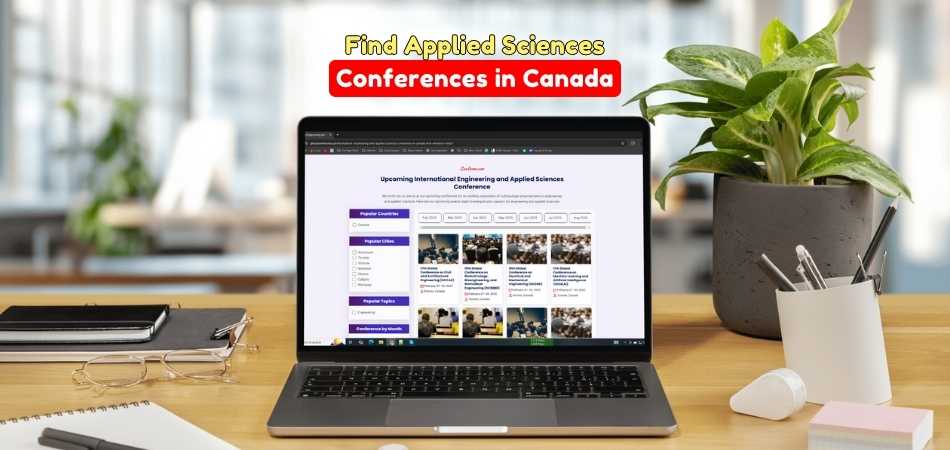Canada hosts a wide range of applied sciences conferences, drawing professionals and academics to share ideas and research. These events focus on various fields like engineering, technology, and environmental sciences. Now, you might be wondering, How to find applied sciences conferences in Canada?
Find applied sciences conferences in Canada by searching online, exploring university event pages, and joining professional networks. Check academic newsletters, consult professors, and review past conference announcements. Libraries, academic societies, and community boards also provide valuable leads for upcoming events.
Curious to learn more? This article outlines all the steps you need to discover applied sciences conferences in Canada. Keep reading to find detailed, actionable tips that will guide you toward the best events!
How to Find Applied Sciences Conferences in Canada?
Finding the right conference can be exciting, especially when you’re looking to connect with others who share your interests in applied sciences. Whether you want to learn or present your ideas, there’s always a way to find the best events. Here is a detailed guide to assist you through the process.

Start with a Focused Online Search
Online searches are often the first step in finding conferences. Use specific phrases like “applied sciences conferences in Canada” to narrow your options. Adding details like the event year or location can make results more relevant. Explore the first few search results carefully to gather useful leads for further exploration.
Look into University Event Pages
Applied science conferences are regularly sponsored or organized by universities. Check their event sections or academic calendars for announcements. Science or engineering departments often promote these events on their websites, making them an excellent place to find detailed schedules, registration information, and participation guidelines for conferences near you.
Conference Websites
Conference websites like Global Conference Alliance Inc. focus on organizing and listing global events. They provide detailed information on upcoming conferences, such as an applied sciences conference in Canada, including calls for papers, schedules, and registration details. This platform is a valuable resource for researchers and professionals seeking international conferences in Canada and worldwide.
Connect Through Professional Networks
Engaging with professional organizations related to applied sciences can reveal valuable information about conferences. These networks often have members who organize or attend such events. Discussing with professionals or participating in local meetings can give you leads about the latest conferences happening in Canada.
Read Academic Newsletters and Publications
One of the best places to find conferences is through academic newsletters and related publications. They often feature announcements about upcoming events. Subscribing to these resources ensures that you stay updated on the latest happenings, particularly in applied sciences. Pay close attention to newsletters from institutions that specialize in your area of interest.
Join Study Groups or Academic Societies
Information about conferences is frequently shared by study groups or societies within your field. These communities are excellent for staying informed. Discussions in these groups might include details about applied sciences conferences in Canada or elsewhere. Joining such societies gives you access to reliable information about upcoming events.
Research Past Conferences
Looking at previous conferences is a helpful way to identify future events. Many organizers announce their next sessions during or after an event. By attending an applied sciences conference, you may find information about similar conferences scheduled in Canada, allowing you to plan with confidence.
Consult Professors and Advisors
Professors and academic advisors are invaluable when it comes to finding conferences. They often receive announcements about relevant academic events and can guide you toward the best opportunities. Their insights can save you time and ensure the conferences align with your academic or professional goals.
Explore Libraries and Academic Resources
Academic libraries can help you find conferences by offering access to directories and lists of events. Librarians are knowledgeable about academic resources and can guide you in locating applied sciences conferences. These resources are often overlooked but can provide detailed and reliable event information.
Check Local Community Boards
Flyers or posters for conferences are frequently displayed on community boards in libraries, colleges, or local centers. Checking these boards regularly can help you spot announcements about applied sciences conferences in Canada. Pay attention to the event details and follow the contact information for further inquiries.
How Do I Check University Event Calendars or Departmental Announcements for Relevant Conferences?
It takes planning to find academic events or conferences that align with your interests. University event calendars and departmental announcements are valuable resources. With the right approach, staying updated becomes easy and effective. Here is some practical information you can use:
Visit Your University’s Official Website Regularly
University websites often feature dedicated event calendars. These sections list all upcoming conferences, lectures, and workshops. Make it a habit to visit this page regularly to stay informed. You can also check specific academic departments’ pages for events suited to your field of interest, ensuring you don’t miss relevant conferences.
Sign Up for Email Notifications and Newsletters
Most universities offer email subscriptions for newsletters that include event announcements. Subscribing to these updates will bring conference information directly to your inbox. These newsletters often provide details about upcoming events, deadlines, and registration links, helping you stay on top of relevant academic opportunities without actively searching.
Join University Clubs and Organizations
University clubs and organizations often host or participate in applied sciences events and conferences. Joining these groups can provide you with direct access to event schedules and networking opportunities. Besides, club meetings often include discussions about upcoming events, ensuring you stay informed about conferences relevant to your interests.
Check Departmental Bulletin Boards
Departments within universities often have their own websites or bulletin boards that provide focused updates. These resources highlight conferences that are specific to your field of study. Regularly checking departmental pages or boards allows you to access information that may not be posted on the main university site, ensuring a more personalized selection of events.
Engage With Faculty and Academic Advisors
Your professors, faculty members, and academic advisors are valuable resources when it comes to finding conferences. They are often involved in organizing events or have access to information on upcoming opportunities. Building relationships with them can help you gain insider knowledge on relevant conferences and events that might not be widely advertised.
Utilizing these resources ensures you’ll stay informed about important academic events. Whether it’s checking websites, subscribing to newsletters, or engaging with faculty, these strategies will help you consistently find the conferences that matter to your academic goals. Stay proactive and don’t miss out!
Social Media Platforms and Groups Most Active in Sharing Applied Sciences Conferences
A good way to keep up with applied sciences conferences is through social media. Many platforms and groups regularly share relevant conference information. Below are some of the best places to check for updates and announcements.
- LinkedIn: This platform is popular among professionals, making it a valuable source for conference announcements and discussions in applied sciences fields. Follow relevant groups for regular updates.
- Facebook Groups: Numerous academic and professional groups on Facebook share information about upcoming conferences. Join specific applied sciences groups for discussions and event details.
- Twitter: Academic institutions and organizers often tweet about conferences in applied sciences. By following relevant hashtags or organizations, you can receive timely updates on upcoming events.
- Reddit: Subreddits dedicated to science, research, and academia often share applied sciences conference information. These groups allow for easy interaction and networking with others attending the events.
- ResearchGate: ResearchGate allows researchers and professionals to share academic events. It’s a great platform for discovering applied sciences conferences and interacting with fellow participants.
- Slack Groups: Many academic organizations use Slack for communication. Channels dedicated to specific topics, like applied sciences, often post about upcoming conferences and provide direct links for registration.
Social media platforms and groups offer quick access to information about applied sciences conferences. By staying active in these spaces, you can easily discover the latest events and connect with like-minded individuals.
How to Use Targeted Keywords to Find Applied Sciences Conferences?
Without the proper keywords, searching for specialized or small conferences can be overwhelming. Using specific and targeted terms helps narrow your results effectively. Here are some keyword strategies that will help you refine your search.
Use Field-specific Keywords
Incorporating terms like “applied sciences” or specific subfields such as “biotechnology” or “material science” can help you find more focused events. These words direct your search toward specialized conferences relevant to your interests.
Include Geographic and Date Filters
Adding location-based terms like “Canada” or “Europe” along with specific years ensures your search results are timely and relevant. These strategies are among the most effective ways to find international applied science conferences, helping you avoid broad or irrelevant results.
Add Terms Like “Small-scale” or “Specialized”
Using phrases such as “niche,” “specialized,” or “focused” can help identify smaller conferences. These terms highlight events that cater to specific interests or less general audiences in applied sciences.
Search for Conference Formats
Including words like “workshop,” “seminar,” or “symposium” can help you find small-scale gatherings. These formats are often specific to a particular subject, offering more in-depth discussions compared to larger, general conferences.
Combine with Academic Keywords
Words like “research,” “academic,” and “scholarly” refine your search toward academic and research-based conferences. Pair these with applied sciences-related keywords to pinpoint events that prioritize specialized topics and discussions.
Using the right keywords simplifies your search for small-scale or specialized conferences. By combining targeted terms with geographic or academic filters, you can find events that align with your specific interests and goals effectively.
Conference Directories Provide the Most Detailed Listings for Applied Sciences Events in Canada
Finding the right conference in the applied sciences field requires using reliable platforms that list detailed information about upcoming events. Many directories specialize in academic events across various fields, including applied sciences. Read on to find some of the best ones.
Global Conference Alliance Inc.
One of the best resources for finding applied sciences events in Canada is the Global Conference Alliance Inc. This directory provides a user-friendly platform with detailed listings of international and local conferences. It covers a wide range of applied science topics, making it ideal for staying up-to-date with the latest events in your field.
10times
A detailed platform for listing conferences, 10times provides comprehensive information about events in a variety of industries, including the applied sciences. It features an extensive database with filters that allow users to search for conferences by location, making it easy to find events in Canada that are most relevant to their interests.
Resurchify
It is a great platform for finding academic conferences, especially in applied sciences, on Resurchify. By providing detailed information about dates, locations, and themes of conferences, users can narrow down their search. Resurchify’s focus on scientific and technical events makes it a valuable resource for researchers looking for relevant conferences.
How Can I Use Filters Effectively to Find Conferences That Match My Area of Interest and Location?
You can find events that are specific to your location and area of interest more quickly by using filters on conference directories or event platforms. It saves you time and ensures that you don’t miss the most relevant opportunities. Here’s how to use filters effectively for a more focused search.
Use Relevant Keywords for Your Field
By entering specific keywords related to your research area or field of interest, you can filter out irrelevant results. This feature helps narrow down conference options based on particular topics, ensuring that you find events that are most aligned with your academic or professional goals.
Set Location Preferences
Most platforms offer filters to search conferences based on location. This allows you to focus on events held in your country, region, or even a specific city. Setting this filter is crucial if you want to avoid distant conferences and concentrate on more accessible events close to your area.
Select Dates That Work for You
Using the date filter helps you find conferences that fit within your available time frame. Whether you are planning for an event later this year or looking for something in the next few months, adjusting the date range ensures that you discover conferences that won’t conflict with other commitments in your schedule.
Choose Conference Type or Format
Conference platforms often allow you to filter events by type, such as workshops, webinars, or large conferences. This helps you identify the format that best suits your learning or networking style. Whether you prefer hands-on workshops or large networking conferences, selecting the right format makes a significant difference in your experience.
Look for Relevant Organizers or Sponsors
If you’re familiar with certain institutions or companies that host valuable conferences, use this filter to search for events by organizer or sponsor. This ensures that you can attend conferences hosted by respected organizations, which may offer more valuable content and greater networking opportunities in your field.
By using filters effectively, you can streamline your search for relevant conferences. Whether it’s focusing on keywords, location, or event types, applying the right filters makes it easier to find conferences that align with your goals. Stay organized and make the most of every opportunity!
Are There Any Government-funded Initiatives That Provide Financial Support for Attending These Events?
It can be expensive to attend professional and academic conferences, but several government-funded programs provide financial assistance to help with costs. These initiatives can ease the financial burden and encourage greater participation in important events. Let’s explore how to access this support.
Government Grants for Research Events
In many countries, government agencies offer grants specifically designed to support researchers and professionals attending academic conferences. These grants often cover registration fees, travel, and accommodation expenses. Applying for these grants is a great way to access funding without worrying about the financial strain of attending.
Local Government Funding for Professional Development
Professional development opportunities, such as attending conferences, are often funded by local governments. These funds may be available through local agencies or initiatives aimed at advancing specific industries or research areas. Check with your local government or council for available programs and application processes.
National Science and Research Foundations
For professionals and students attending conferences, national organizations like science and research foundations frequently offer funding. These foundations focus on improving knowledge in specific fields, and their funding opportunities typically cover international events. Visit these organizations’ websites for eligibility criteria and application deadlines.
Industry-Specific Government Support Programs
There are government-funded programs specific to certain industries that help professionals attend industry-related conferences. These programs are relevant to various sectors, including technology, health, and engineering. You can find these opportunities by researching industry associations or government departments associated with your professional field.
International Travel Grants for Conferences
Many governments offer international travel grants for individuals who wish to attend global conferences. These grants are typically available for those involved in research, academics, or professional development. Research available travel grant programs by checking with your university or professional organizations to find the right opportunities.
Government-funded initiatives offer valuable support for attending conferences. Whether it’s research grants, local funding, or travel assistance, these programs make it easier to participate in key events.
How Far in Advance Should I Book Travel and Accommodation to Attend a Conference in Canada?
Planning your travel and accommodation for a conference is essential to avoid last-minute stress and higher costs. Booking at the right time ensures you get better deals and secure your spot. Here are some practical tips to assist you.
Flights Booking
Conference flights to Canada can sell out fast, particularly during busy times of the year. Booking your tickets 2-3 months before you attend an applied science conference in Canada ensures you get better prices and seat availability. Early booking also allows flexibility in choosing your preferred flight times.
Reserve Hotels Once Dates Are Confirmed
Once your attendance is confirmed, reserve your accommodation right away. Hotels near conference venues tend to sell out fast, so booking early guarantees you a convenient location. Many hotels also offer discounts for early reservations, helping you save money on your stay.
Look for Cancellation Policies
When booking, choose travel and accommodation options with flexible cancellation policies. This allows you to make changes if conference details or your plans shift unexpectedly. Flexibility is especially important when dealing with long-term bookings or unpredictable schedules.
Check for Group Discounts or Partnerships
Some conferences partner with airlines and hotels to offer special rates for attendees. Check if your event provides group discounts or promotional codes. This can significantly lower costs for both travel and lodging, making your trip more affordable and convenient.
Monitor Seasonal Price Changes
Travel costs often fluctuate based on the time of year and location. If the conference is during peak tourist seasons, prices will likely be higher. Booking early protects you from price hikes and ensures availability, especially for events held in major cities or popular destinations.
Planning ahead for travel and accommodation is key to a smooth conference experience. By booking flights and hotels early, considering cancellation policies, and checking for discounts, you can ensure a hassle-free trip. Start early to stay stress-free!
FAQs About How to Find Applied Sciences Conferences in Canada?
Here are some frequently asked questions about finding applied sciences conferences in Canada. These answers will guide you through additional tips and resources to help you discover the best events related to your field.
How Can I Find Specialized Conferences in Applied Sciences?
To find specialized conferences, try searching for specific subfields like “applied physics” or “environmental science.” Use targeted keywords in online conference directories and academic search engines. You can also consult specialized journals and societies, which often list events related to niche topics in applied sciences.
Are There Any Specific Websites for Canadian Applied Sciences Conferences?
Yes, websites like Global Conference Alliance Inc. focus on events held across Canada. These platforms provide listings of upcoming applied sciences conferences, complete with dates, locations, and registration information, making it easier to find relevant events.
How Do I Stay Updated on Conferences Year-Round?
To stay updated on conferences throughout the year, consider subscribing to mailing lists from event organizers, associations, and university departments. Following relevant social media accounts and setting Google Alerts with keywords like “applied sciences conferences Canada” can also ensure you don’t miss important announcements.
Are There Student Discounts for Applied Sciences Conferences in Canada?
Many applied sciences conferences in Canada offer student discounts or special rates. To access these discounts, check the event’s registration page and look for any “student” pricing options. Besides, inquire with university departments or conference organizers to see if there are scholarships or funding opportunities available.
How Can I Network at Applied Sciences Conferences?
Networking at conferences can be achieved by attending keynote sessions, participating in workshops, and visiting exhibitor booths. Engage with speakers and other attendees during breaks and social events. Consider joining professional networks or academic societies, where you can connect with like-minded individuals before and after the event.
Final Word
Finding applied sciences conferences in Canada opens doors to new opportunities and collaborations. These events are great for connecting with experts and exploring innovative ideas in your field. With the right strategies, you can easily discover and attend impactful conferences.
To answer the question, how to find applied sciences conferences in Canada?, start by using focused online searches, checking university event pages, and engaging with professional networks. Don’t forget to subscribe to academic newsletters and explore directories that specialize in applied sciences events for the latest updates.
As you search for the right conferences, plan ahead by setting clear goals, organizing your schedule, and taking advantage of early-bird registrations. Wish you success in finding the perfect event that aligns with your interests and aspirations.









